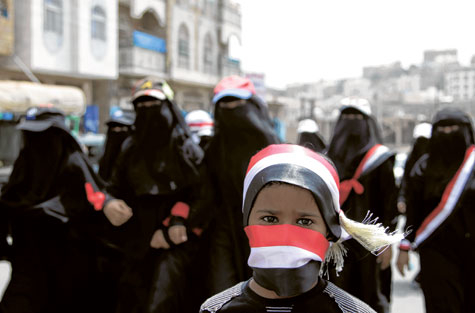
Dubai: A top American official called for “immediate” transfer of power in Yemen, which some say is just taking advantage of the absence of the Yemeni president Ali Abdullah Saleh.
Saleh is in Saudi Arabia having medical treatment for serious injuries he suffered on his complex earlier this month.
Jeffrey Feltman, the US Assistant Secretary for Near Eastern Affairs, told reporters in Sana’a "we continue to believe that an immediate, peaceful, and orderly transition is in the best interest of the Yemeni people”.
"We urge all sides to engage in dialogue that peacefully moves Yemen forward," he added in his statement after meeting the Yemeni Vice President Abdrabuh Mansur Hadi.
Pressure
Asked if there was pressure on Saleh not to go back to Yemen, Feltman said: "We expect the president to take a decision in the best interests of the Yemeni people. It is a Yemeni decision, not an American decision."
However, unidentified western diplomats in Sana’a were quoted by press reports as saying that Saleh is unlikely to return home soon, because “we believe he was seriously injured ... He is not coming (home) in the coming days, he is not coming (home) soon.”
Commenting on the American and western statements to Gulf News, Abdul Gani Al Iryani, a Yemeni political analyst, believed there is an “American effort in cooperation with Saudi Arabia and the rest of the Gulf Cooperation Council members, to make such statement to show that the president’s return is not possible (soon) and to convince his (Saleh’s) children to cooperate in the power transfer issue.”
Acting President
Since Saleh’s departure to Riyadh on June 4 for medical treatment, Acting president Hadi because under pressure to assume power – an issue that is being questioned as Saleh sons and nephews, who control some of the most powerful pillars in the military institution, including Saleh’s son, Ahmad, who leads the elite Republican Guard.
Ahmad and other important members of Saleh's family including continue to prevent any handover of power without Saleh's consent, reports said.
Feltman has also met with Ahmad and his brother Khaled, analysts said.
“The Americans are trying to achieve a power transfer before Saleh’s return,” said
Dubai-based Mustafa Alani, director of security and terrorism research at the Gulf Research Center.
Resign or retire
“And once Saleh returns, the issue will be solved and Saleh will be forced either to resign or retire. I believe they (Americans) won’t be successful in this,” Al Ani told Gulf News.
Ani explained that his view is based on the fact that the system in Yemen is still in place.
“There is no system in the world where the president, the prime ministers, the parliament speaker and several senior ministers suffer serious injuries and leave the country and the system doesn’t collapse,” Ani noted.
The Americans were hoping that the system in Yemen will collapse hours after Saleh was flown to Saudi Arabia in a similar scenario to what happened in Egypt and Tunisia.
But the Yemeni political structure survived the attack on Saleh.
'None of their business'
However, to Saudi Arabia, Saleh’s return or not is “non of their business, and this is something up to him to decide,” Ani said.
“They (Saudis) can’t stop Saleh from returning to his country…. Otherwise they wouldn’t have allowed the presidential plane to land in Riyadh (recently)” to take back Saleh once he is ready.
Smooth transfer
GCC-brokered deal to achieve a smooth power transfer in Yemen has failed, after Saleh refused to sign the deal.
While Feltman said that the “United States supports the initiative proposed by the Gulf Cooperation Council (GCC) as a credible path to confront the challenging political situation in Yemen," Yemeni analysts said Yemen’s stability is a priority to Washington.
“The most important thing to the US to restore stability in the country so there will be a government capable of fighting terrorism” noted Iryani.
Western diplomats also added that explosion targeting the mosque of the presidential complex on June 3rd, was caused by a many bombs planted in the mosque.
Saleh was wounded by a TNT explosive, while the other bombs didn’t explode.
Yemeni security officials confirmed that five explosives inside the mosque and a sixth one outside it didn’t explode.












